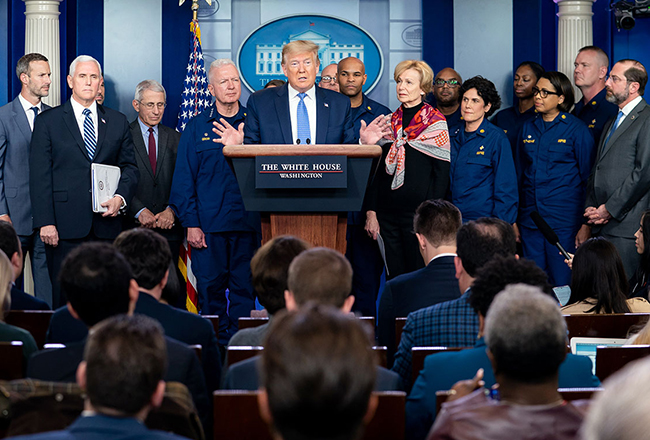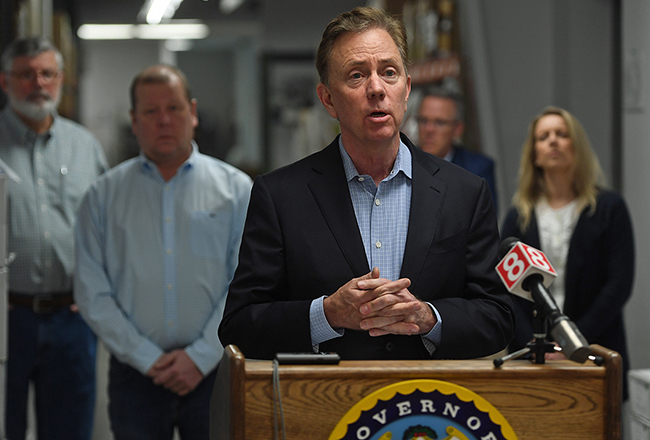
Official White House Photo by Tia Dufour
As the COVID-19 pandemic metastasized from a strange health crisis in other parts of the world into the shutdown of major sectors of American society, mainstream media coverage of the story grew to the point where it is now commands everyone’s attention.
Regional media professionals and observers have expressed mixed opinions on how mainstream media is covering the story.
Public relations executive Ronald R. Magas is starting to find the coverage more than a little overwhelming.
“I”™ve never seen anything quite like this crisis,” said Magas, who runs Magas Media Consultants LLC in Monroe. “Turn on the TV, your watch, your phone, your tablet and you get information. The problem: There is too much information. It”™s overkill at this point. It is now the only thing on people”™s minds and there is other news out there that people should be focused on.”
Lennie Grimaldi, who writes and publishes the Only in Bridgeport blog, pointed out that stories related to COVID-19 now dominate his website.
“Each day it’s getting closer to home for my audience,” he said. “My focus is spreading as much information as possible to fill in questions of local readers via city and state officials or health care professionals, rules for unemployment benefits. My wife is a chemist for a hospital in Connecticut, so that also provides some insight into how the health emergency impacts the medical industry.”
Adam Rugg, assistant professor of communication at Fairfield University, believed the evolution of the 24/7 news cycle has created an impression of overkill.
“It can feel overwhelming because we”™re immersed in media all of the time,” he said. “It can feel like a nonstop bombardment.”
Bill Yousman, associate professor in Sacred Heart University”™s School of Communication, Media & the Arts, pointed out that it is a mistake to view the mainstream media as a single entity.
“You have to drill down more specifically,” he explained. “Some media sources are doing a good job with it. Other media sources are either downplaying it or giving too much credence to sources that don”™t have good information.”
Yousman praised The New York Times and Washington Post”™s national coverage and cited Connecticut radio stations WNPR and WSHU for their take on local updates. He lamented that cable television “maybe sensationalized it a little bit with special documentaries framed in a fearful manner, showing people in hazmat suits.” But he reserved his ire for one media outlet in particular.
“Fox News has done a really, really terrible job,” he said. “And it is actually dangerous because their main demographic is older people. They”™re just the mouthpiece of the Trump administration and have taken up his line of downplaying it and giving false information. Geraldo Rivera made some really outrageous claims with no sane basis.”
John Roche, assistant professor of journalism at Western Connecticut State University, admitted that some aspects of the mainstream media have turned into infotainment, with both sides of the political spectrum “giving spin instead of giving accurate information.”
Still, he expressed admiration for how the mainstream media has taken on the complexities of the story.
“I”™ve seen some really spectacular coverage in a way that is unprecedented in my lifetime,” he stated. “9/11 was a one-day event with implications that kept carrying on, but this is an ever-changing target. Most journalists have done a pretty good job in getting out accurate and verified information.”
Running parallel to the mainstream media is social media, which is often less concerned with reporting the facts.
Matthew Chudoba, a strategic communications professional with Norwalk-based ICR, saw firsthand how incorrect social media announcements make a bad situation worse.
“This has also brought out the worst in social media, as I”™ve seen a lot of fake news being circulated,” he said. “Someone showed me a tweet that claimed Gov. (Charlie) Baker was going to lock down the state of Massachusetts. I was with Massachusetts residents at the time in Florida and they were panicking over it.”
Chase Hutchison, senior vice president at Brookfield-based Mack Media Group and co-host of “The Mack Talks” podcast, put the onus on the social media users to be cognizant of their information sources.
“As consumers of media, I think the most important thing is to watch where we get our news from,” he said. “If it’s not from a credible source, don’t take it as fact ”“ and definitely don’t share it with friends and family. We should be doing this anyway, but it’s even more important during this crisis that people receive factual information.”

















